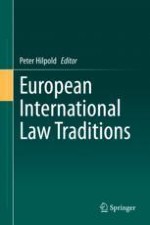2021 | OriginalPaper | Chapter
International Law from a Nordic Perspective
Authors : Jakob v. H. Holtermann, Astrid Kjeldgaard-Pedersen
Published in: European International Law Traditions
Publisher: Springer International Publishing
Activate our intelligent search to find suitable subject content or patents.
Select sections of text to find matching patents with Artificial Intelligence. powered by
Select sections of text to find additional relevant content using AI-assisted search. powered by
